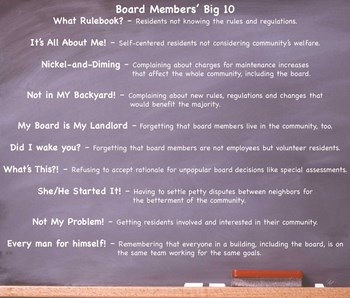
Everyone loves a Top 10 list and the co-op and condo world is no different. Besides, if Letterman can do it, so can we. With that in mind, this month we’ve got the top ten things that drive board members crazy about their residents and the top ten things that make residents pull their hair and curl into the fetal position. More importantly, we’ve got suggestions on how to put all of those trifling items to rest and help board members and residents find a happy common ground.
So let’s get right to the list making, shall we?
Board Members’ Big 10
1) What Rulebook? Residents not knowing the rules and regulations of the community in which they live can cause major headaches for board members…and for other unit owners. Jack McGrath, now finishing his 10th year as board member for The Grande at Colt’s Neck in New Jersey, recalls a neighbor who admitted to him that he’d never once read the condo community’s rulebook. Instead, he would come to Jack with questions on what was and wasn’t allowed. Without becoming familiar with regulations, residents have a far greater chance of accidentally breaking a rule, incurring a fine and finding themselves in a mess of trouble down the line. Ironically, it’s often the folks who know the least about their community’s rules who complain the loudest when they find themselves called out for breaking one.
2) It’s All About Me! Sometimes problems within a community arise simply because residents don’t consider the needs and welfare of their neighbors. Whether it’s installing a satellite dish that blocks a shared view or putting in a motion detector that floods a neighbor’s bedroom with light at four in the morning—these are the kind of arguments that end up being hashed out at a board meeting, taking time and energy away from issues that affect the community as a whole. “It gets back to the board and becomes something they have to solve,” McGrath says.
3) Nickel-and-Diming -- “They’ll ask, ‘Why are you charging me?’” for maintenance increases, says Mona Shyman, vice president of the Federation of New York Housing Cooperatives & Condominiums (FNYHC). “And then the board member has to remind them, “I’m paying the same thing!”
4) Not in MY Backyard! No one likes change, especially when it involves the place we call home. Board members, though, tend to dislike change more than anyone because they are the ones who hear the complaints when those amendments go into effect. Changes in pet rules or sublet rules can be especially contentious.
5) My Board is My Landlord “Sometimes residents forget that board members live there, too,” Shyman says. Tempers might not flare so hotly if residents kept in mind that board members are unpaid volunteers who have to live under the same rules and regulations as their non-board member neighbors.
6) Did I wake you? Sometimes residents forget that board members are not employees. “I’ve had residents who would think nothing of calling me at six in the morning or 11 at night and telling me to come over and fix their air conditioning,” says Nina Stanton, a board member with the New Jersey chapter of the Community Associations Institute and a board member for Medford Lakes Colony in Medford, New Jersey.
7) What’s This?! It’s never easy making financial decisions on someone else’s behalf, but that’s the responsibility of each and every co-op and condo community’s board. Special assessments can prove especially unpopular, but often assessments are chosen “because they’ll go away over time,” Shyman says. Assessments to cover things like unexpected snow removal or skyrocketing insurance rates like after 9/11 are like a painful injury—they hurt when they happen, but hopefully heal quickly.
8) She/He Started It! It’s easy for long-time residents to forget why they moved into a community in the first place. A resident can fall in love with their co-op or condo, move in, and a year or two later find themselves sick of the rules and regulations that make the community what it is. When those frustrations arise, so does the likelihood of disagreements among neighbors and with the board. “I’ve seen instances where neighbors go after each other, suing over ridiculous things,” says McGrath.
9) Not My Problem! Running a community successfully requires the participation of everyone who calls it home. “It can be very difficult to obtain volunteers,” McGrath says. “Unless there’s some important issue or concern, very few residents attend meetings.” He recalls a time when board elections had to be postponed three times before they could get a quorum for the vote.
Stanton agrees, “All of our meetings were open once a month and televised on our internal channel.” Still, people were unaware of what was going on. “It’s very disheartening when you put so much into it.”
10) Every man for himself! Often, an “us vs. them” mentality can grow between a board and its residents. It’s vital to remember that everyone in a building is on the same team and working toward the same goal: a healthy, happy place to live, and a sound investment in the future.
The Residents’ Turn
1) Board members with their own agendas – No one likes to admit it, but every now and then someone joins a board not for the altruism but to push their own private agenda…and it can drive residents and fellow board members alike to distraction. It’s counterproductive and rarely works.
2) Fee increases -- Just as board members dislike instituting fee increases; their fellow residents don’t like paying them. “You don’t like to raise fees, but sometimes it’s just reality,” McGrath says.
3) Abatements and their distributions – In New York, abatements on real estate taxes are a factor in a building’s finances—and in a resident’s pocketbook. Disagreements can arise, Shyman says, over how to give those abatements, distributing them at all at once or over a span of months.
4) Lack of communication – It can be very frustrating for residents to feel as though their ideas or concerns aren’t being heard or acted upon. Hard feelings can arise if letters or e-mails are not answered, especially if the property managers are unresponsive. “Very often, there’s little or no communication between boards and shareholders,” Shyman says.
5) Changing of house rules – You know how it drives board members crazy when residents don’t abide by new rules? Well, those new rules can drive residents crazy in and of themselves, no matter what the rationale behind them. Say you used to be able to sublet or own two dogs instead of one. Change is never fun, especially when it affects future plans or current lifestyles.
6) Friends of friends – To those on the outside looking in, many boards can seem like small high school cliques where representation is more about friends and less about representation. For residents thinking of joining the board and volunteering their time, a seeming inner circle can be intimidating.
7) Breaches of confidentiality – The board meeting room should be like Las Vegas, says Shyman. “What happens in the board meeting stays in the board meeting.” There should never be any discussion of the personal issues or problems that residents might have beyond how they affect financial issues or other things directly affecting the community. And that information should never be discussed beyond meeting room doors.
8) Too much stuff to learn– When residents move into their new homes, they’re often handed a stack of papers that make the Oxford English Dictionary look like a People magazine. With the excitement and anxiety that go hand-in-hand with buying a co-op or getting a mortgage, the rules and regulations often fall by the wayside. As a board member, Stanton got creative, hosting semi-annual teas for new residents to help them learn about their homes, meet employees and learn a bit about what was expected of them.
9) Not involving residents in problem solving – Co-op and condo communities can offer a vast mix of expertise with architects, lawyers, plumbers, electricians, accountants, consultants, builders, financial advisors and myriad other professionals living side by side. It can be vexing for residents, says Shyman, when that expertise goes to waste, leaving potential problem solvers on the sidelines.
10) Forgetting that you’re all on the same team – When asked initially to talk about common complaints of board members and residents, Shyman’s first response was that the list was pretty much going to be the same. And at their cores, this is completely true. People just want to be heard and people in co-op and condo communities all just want to have a good place to live.
That’s why the key to a harmonious and happy residential community is communication. And often that means working together. It’s one of the reasons that Shyman is such a proponent of committees—a solution that mitigates the dissatisfaction caused by item #9 on the resident complaint list. “You need to get people involved,” she says. “If the board is reviewing its insurance policy because of a rate increase, it would be helpful to appeal to residents and ask for anyone involved in the insurance business to sit on a committee and lend their expertise.” It’s the same for engineers and architects when it comes to capital improvements or accountants when it comes to finance. It’s a perfect way to build relationships and build a common belief and spirit of community within the building.
Adds McGrath, “You have to listen. You may not agree with what’s being said, but you have to listen and pay attention to everyone.”
And the lines of communication must be kept open at all times. Newsletters and e-mails and postings and websites all help residents stay connected and help boards and management get the word out on important issues. It’s a two-way street though—the board must provide transparency and residents must take the time to stay informed.
What it all boils down to, says Stanton, is the realization that everyone involved in a co-op or condo community “has to work as a team.”
Liz Lent is a teacher, freelance writer and a frequent contributor to The Cooperator.






2 Comments
Leave a Comment